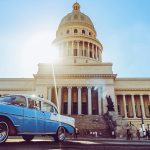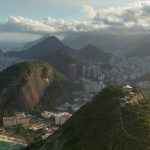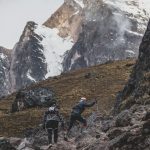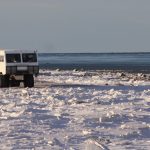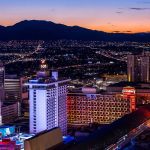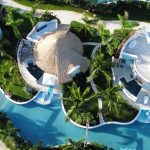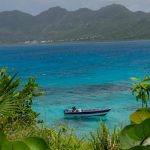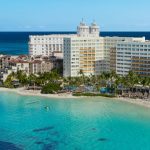ENSEMBLE TALKS TRAVEL AT ROADSHOWS

Travel agents in Vancouver turned out to meet suppliers during the recent cross-Canada travel trade mission by the Ensemble Travel Group, dubbed Ensemble Connections. On hand was Vicky Lubyk (r), western Canada director of sales for Paul Gaugin Cruises, who met with Nazir Hirji, president of HB Travel in Vancouver.

Welcoming travel agents to the Ensemble Connections one-day conference in Vancouver recently was executive staff from Manulife, including (l. to r.) business development manager Tim Millward, business develop-ment manager DeeDee Sixto and national client manager Dan Martell.
VAIL CLOSES RESORTS TO FIGHT VIRUS SPREAD
Vail Resorts has taken the decision to close all of its resorts in North America across 15 states and Canada to help stem the spread of the coronavirus. There are 37 resorts in total, including Whistler Blackcomb in British Columbia and most of the rest in the US, including Vail, Park City and Lake Tahoe.
Vail enacted the suspension at its North American mountain resorts and retail stores as of March 15 through March 22. It is using that time to assess its options for the rest of the season.
Vail’s lodging and property management operations will remain open to service the guests that are on location or holding existing reservations, but no new reservations are being taken for the week. Corporate offices are closed except for essential personnel, and other employees are working from home where possible. All scheduled employees, both seasonal and year-round, are being paid for the eight-day period.
CANADA PUTS CRUISE SEASON ON HOLD UNTIL JULY
The Alaska cruise ship season has been put on hold for three months, as the federal government halts all cruise ship traffic through Canada in response to COVID-19. The first cruise ship of the season was due to dock at Canada Place on April 2 but that has been cancelled.
The federal government announced that cruise ships with more than 500 people will not be allowed to dock in Canada before July, sidelining much of the Alaska cruise season. The ban will affect 127 cruises, mostly in May and June, as the ban is currently set to end on June 31.
Vancouver was expecting 310 cruise ship calls from April to October in 2020. Each of those accounts for about $3 million in direct economic activity, says the Port of Vancouver. There were 1.1 million passengers on 288 sailings in 2019 through the Canada Place cruise terminal.
CARBON NEUTRAL FOR YVR IN 2020
The Vancouver Airport Authority has announced a commitment to become carbon neutral in 2020 and achieve net-zero carbon emissions by 2050. It is one of the sustainability targets outlined in a new 2020 – 2024 Environmental Manage-ment Plan (EMP).
YVR has invested in one of Canada’s largest GeoExchange plants to bolster its ability to reduce carbon emissions. It is also the world’s first airport to receive a Salmon-Safe certification. YVR’s 2020 – 2024 EMP builds on the success of the previous plan and outlines clear, measurable targets to continue to conserve water, reduce waste and improve ecosystem health.



